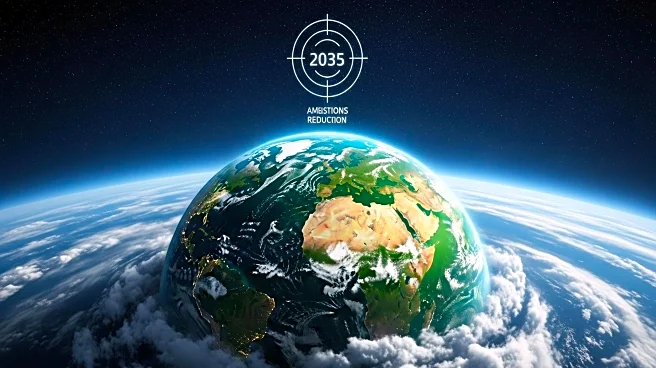What's Happening?
The Australian government is set to announce its 2035 emissions reduction target this week, aiming to significantly cut carbon emissions. This announcement will coincide with the release of several reports, including advice from the Climate Change Authority and a plan to achieve net-zero emissions by 2050. The target is expected to be ambitious, with potential cuts ranging from 65% to 75% compared to 2005 levels. This move is part of Australia's commitment to the Paris Agreement, which requires countries to set increasingly ambitious climate goals. The announcement will also include new policies to reduce greenhouse gas emissions across various sectors such as electricity, transport, and agriculture.
Why It's Important?
The announcement of Australia's 2035 emissions target is crucial for both national and international climate efforts. It reflects Australia's commitment to the Paris Agreement and its role in global climate action. Achieving these targets could position Australia as a leader in climate policy, influencing other nations to adopt similar measures. The ambitious targets could drive significant changes in industries, potentially leading to increased investment in renewable energy and sustainable practices. However, the targets also pose challenges, requiring substantial policy shifts and cooperation from businesses and households to meet the goals.
What's Next?
Following the announcement, the Australian government will likely face scrutiny from various stakeholders, including environmental groups and industry leaders. The implementation of new policies to achieve the emissions targets will be critical, requiring collaboration across sectors. The government may also need to address concerns from industries about the economic impact of these changes. Internationally, Australia's targets will be submitted to the UN, potentially influencing global climate negotiations and encouraging other countries to set ambitious goals.
Beyond the Headlines
The announcement could have deeper implications for Australia's political landscape, as climate policy becomes a central issue in future elections. It may also affect Australia's relationships with Pacific island nations, which have been urging more aggressive climate action. The focus on reducing fossil fuel developments could lead to shifts in Australia's energy sector, impacting jobs and economic growth. Long-term, these efforts could contribute to global efforts to limit temperature rise and mitigate the effects of climate change.










